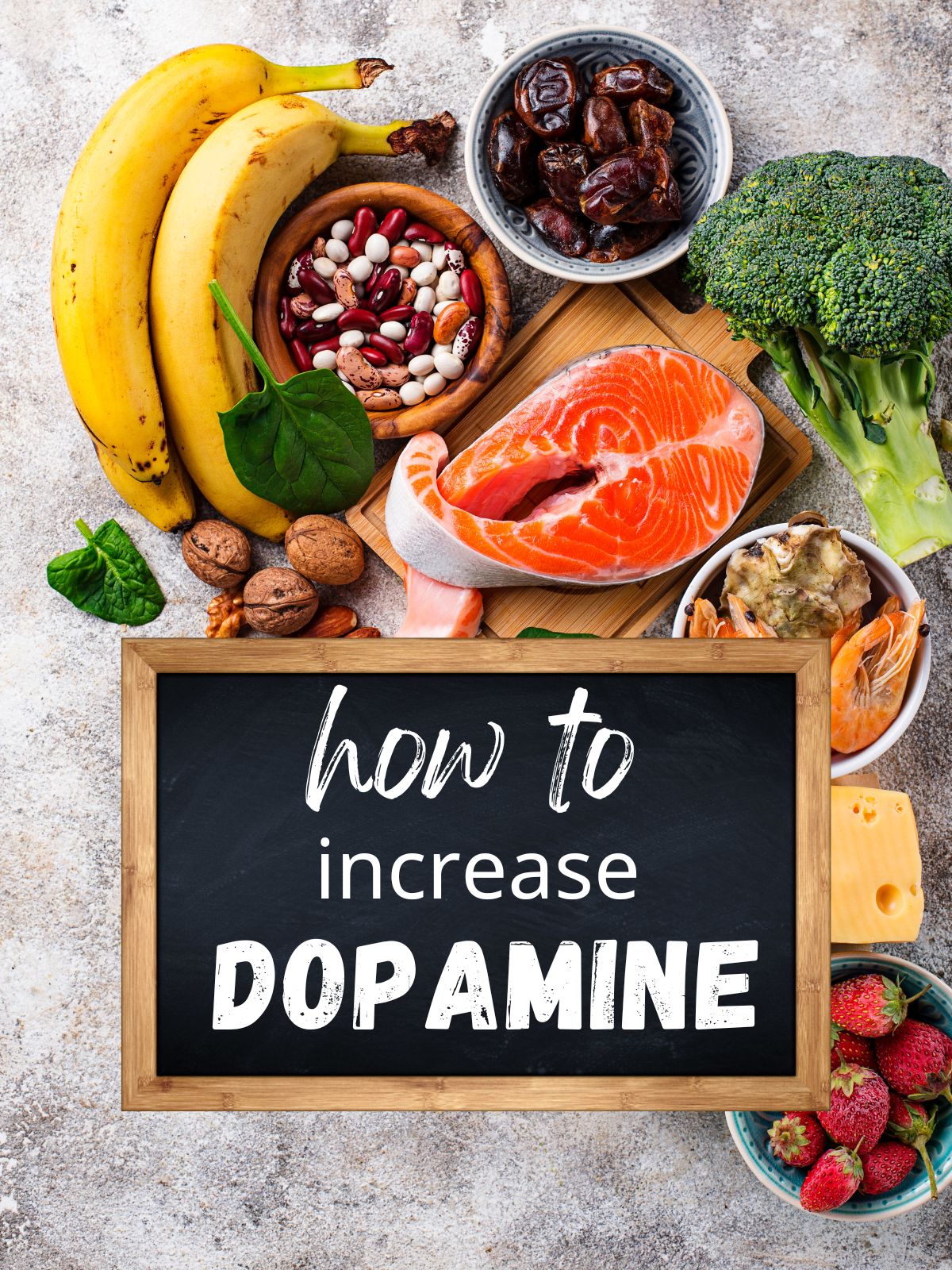The content on this website is for informational purposes only and is not meant to replace professional or medical advice. See our full disclaimer.
If you have ADHD, you may be wondering how to increase dopamine in a natural way to improve your ADHD symptoms.
Our minds and bodies are full of chemicals. They carry out a huge range of functions and play a vital role in keeping us alive.
One of the main reasons why a balanced diet is so important is that a deficiency in a critical chemical can cause serious illness. So let’s learn a bit more about the chemistry of happiness.
What is Dopamine?
Dopamine is a chemical produced in the brain to help send messages between nerve cells. More importantly, dopamine makes us feel happy, and helps us to focus and take an interest in things around us.1Dopamine: What It Is & What It Does (webmd.com)
People with ADHD generally have low levels of dopamine compared with others. This can account for their struggles with areas of life like staying organized and on track and explains why ADHD people are constantly drawn to seek out new sensations.2Attention-deficit-hyperactivity disorder and reward deficiency syndrome - PMC (nih.gov)
The Dopamine Rush
What people with ADHD are looking for is the dopamine rush that you get when you try something new for the first time.
Think of the first time that you read one of your favorite books or heard a favorite piece of music. It feels great, so you read or listen to it again! While you may enjoy further repetitions, they never give you quite the same buzz as that wonderful first time.
Because people with ADHD are generally short of dopamine, they are driven to behave in ways that will help them produce more. One of these is to keep seeking stimulation and new experiences. But what else can you do to boost dopamine levels?
Diet
Since dopamine is a chemical, it makes sense that what we eat can affect how much of it our body produces. It can only work with the raw materials that we provide.
Protein
Dopamine is made from an amino acid present in protein, so a protein-rich diet can help dopamine production in your body.3What is the dopamine diet? | BBC Good Food There is lots of protein in meat and fish, but also in eggs, dairy, soy, and peas and beans.
Healthy Fats
However, research is now showing that high levels of saturated fat can restrict dopamine production.4High saturated fat diet dulls dopamine system, impairs cognitive function (lesliebeck.com) This is one of the types of fat found in meat, full-fat dairy, and in palm and coconut oil.
So, to boost your dopamine, eat lean meat and reduced-fat dairy to get the best of both worlds, or healthy fats from olive oil, avocado, or fresh tuna.5What is the dopamine diet? | BBC Good Food
Gut Health
Finally, more and more evidence is emerging of links between the health of our digestive system and our mental health, including the production of dopamine by some bacteria in your gut.
Eating a healthy, balanced diet will also help in this respect, and consuming probiotic products to help your gut health may also be of benefit.
Exercise
Regular exercise goes hand in hand with healthy eating habits, but research has shown that people with ADHD may find it hard to motivate themselves to break out of inactivity.
However, exercise increases blood flow around your body, including to your brain, which can in turn increase dopamine production.6Exercise Boosts Dopamine Release, and this Requires Brain-Derived Neurotrophic Factor | NYU Langone Health If you are struggling or feeling down, even taking a walk may help as it makes a physical difference to what is going on in your brain.
You may not feel like doing anything, but if you can get over that inertia you really can help yourself.
Sleep
Continuing the theme of self-care, regular and healthy sleep can ensure that you keep your dopamine levels as high as possible. Our bodies have a natural rhythm, including high production of dopamine in the morning and lower in the evening as we approach sleep.
Disrupting this rhythm by reduced or irregular sleep can confuse our bodies and minimize dopamine production.7The role of dopamine in sleep regulation | EurekAlert! So not only will you feel tired if you do not get enough sleep, but your dopamine levels may also contribute to a low mood.
Make something
Creativity is a mindfulness activity that provides a dopamine reward, so any form of productive activity is likely to help your mood. It does not matter how good you are at what you do, only that you produce something and feel a sense of accomplishment for doing so.
Of course, it makes much more sense to craft something that you enjoy, which will provide the double benefit of the pleasure of the process and the reward of completion. Creativity can also help to focus the conscious part of your mind leaving your unconscious free to work through things that are bothering you without you interfering.
So, by the time you have painted a picture, baked a cake, or written a story, you may find you also have new ideas as to how to tackle other things you need to do.
Organize
This may seem a strange thing to suggest to ADHD people who often find organization difficult, but you can get a dopamine reward from your brain from getting things done in a similar way to producing something creative.
Set Achievable Goals
The key here is to be realistic and even to trick your brain into feeling accomplished. Instead of writing a long list of things to do that you know you will struggle to get to the end of, start your list with a few things that you have already done.
This can include anything, so getting up, having a shower, having breakfast and so on can all go on your list and be immediately ticked off. Then just add one or two realistic goals that you have not yet done to the end of the list and tick those off as you complete them.
Write it Out
Our Free Printables can really help you write out your goals and get that dopamine hit when you cross them off:
- Free ADHD Planner pdf
- ADHD Puzzle Goal Map
- 3 free printable To-Do Lists
- ADHD Cleaning Checklist
Conclusion
While there is much about our minds and mental health that we do not really understand, there is a strong element of chemistry in how our brains and bodies work.
Since dopamine plays a key role in our mood, it makes sense to understand a bit more about what is going on and to do more of the things that help. A few small changes could make a big difference over time.
References:
- 1
- 2
- 3
- 4
- 5
- 6
- 7





We'd love to hear from you